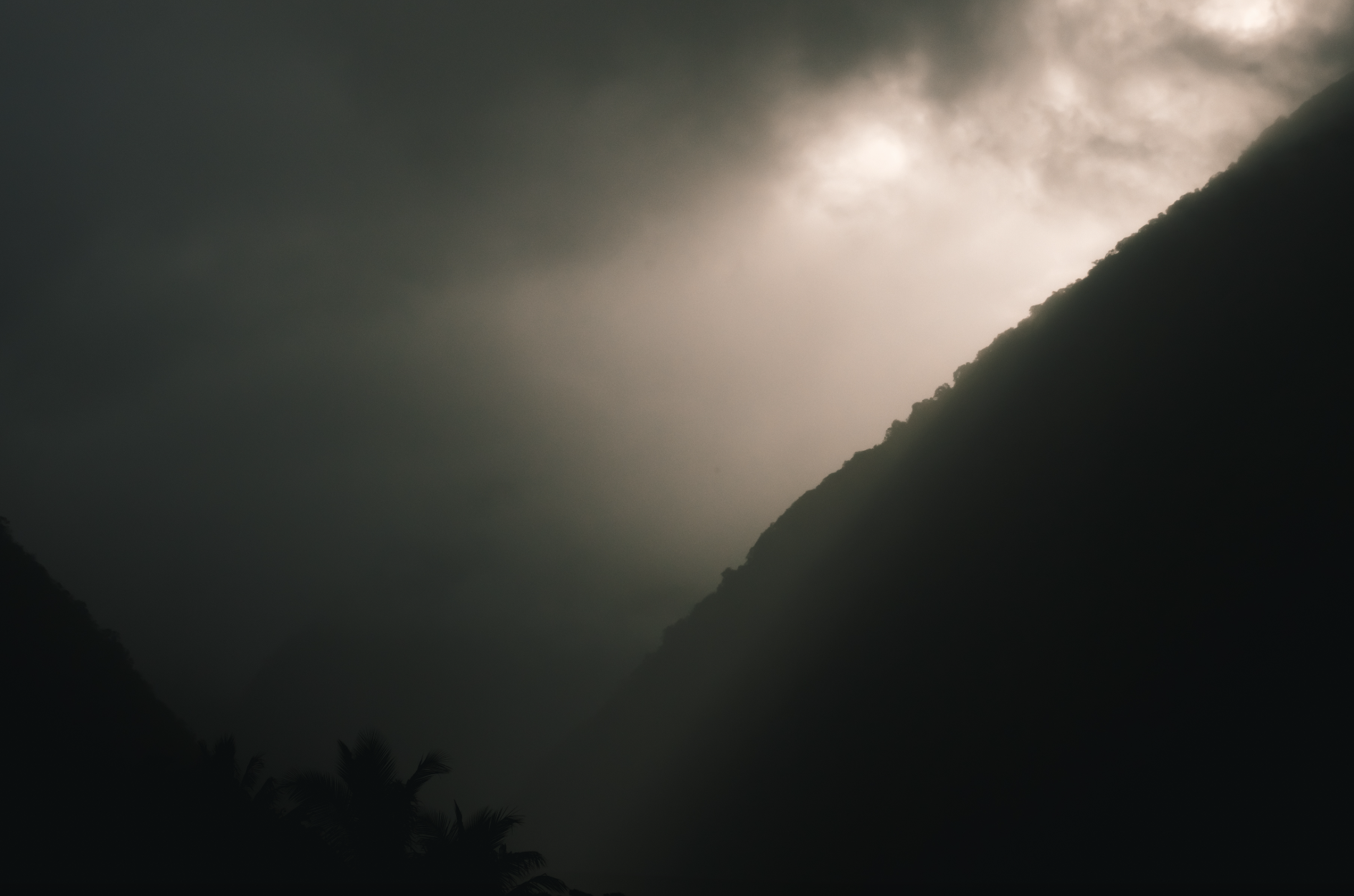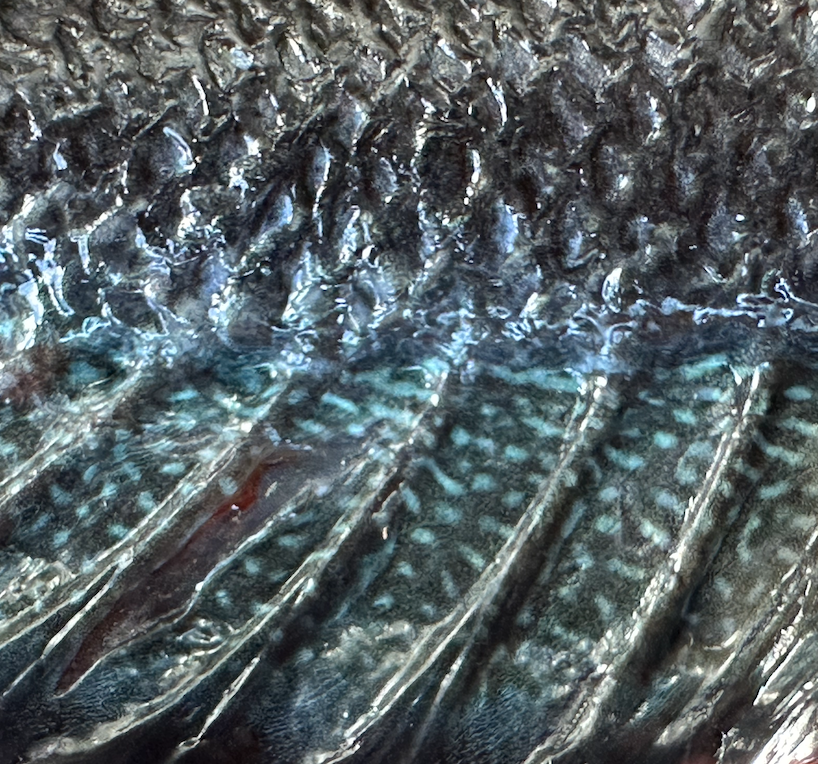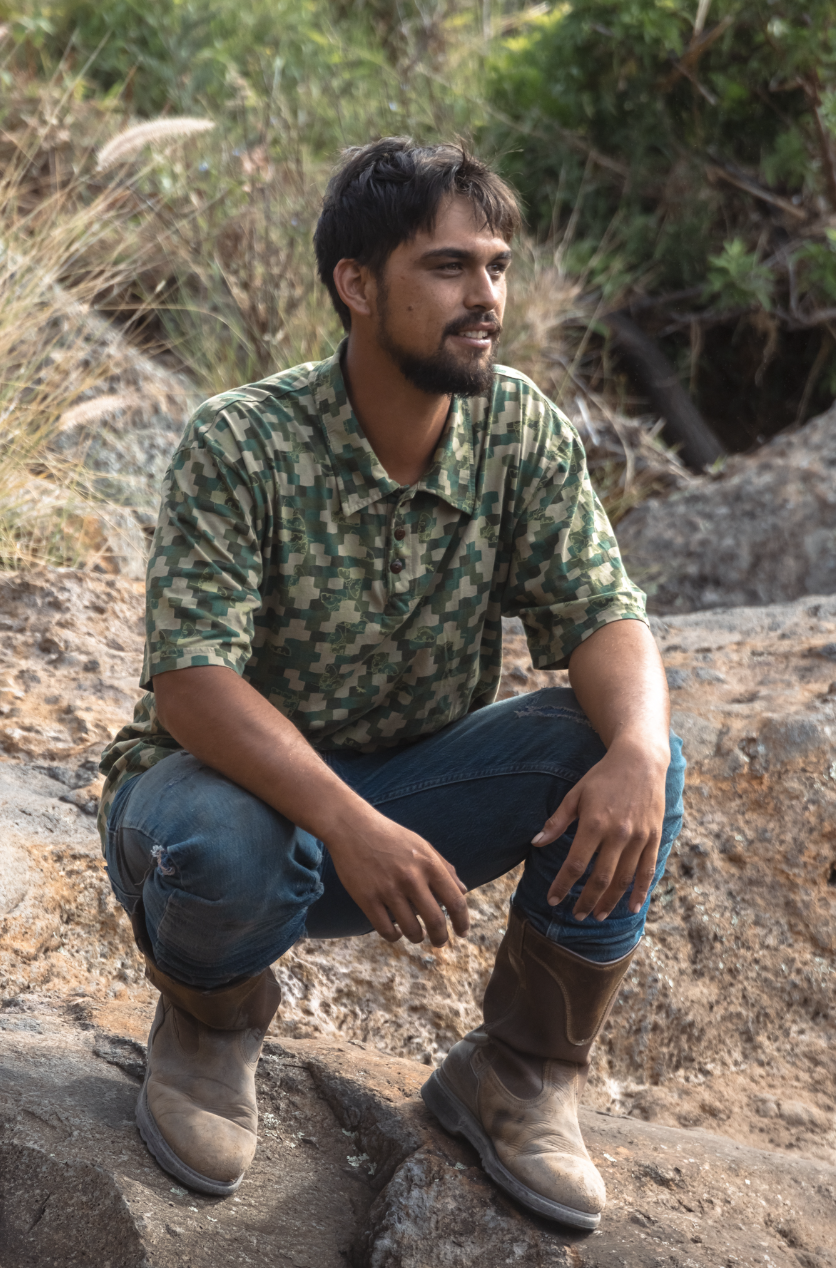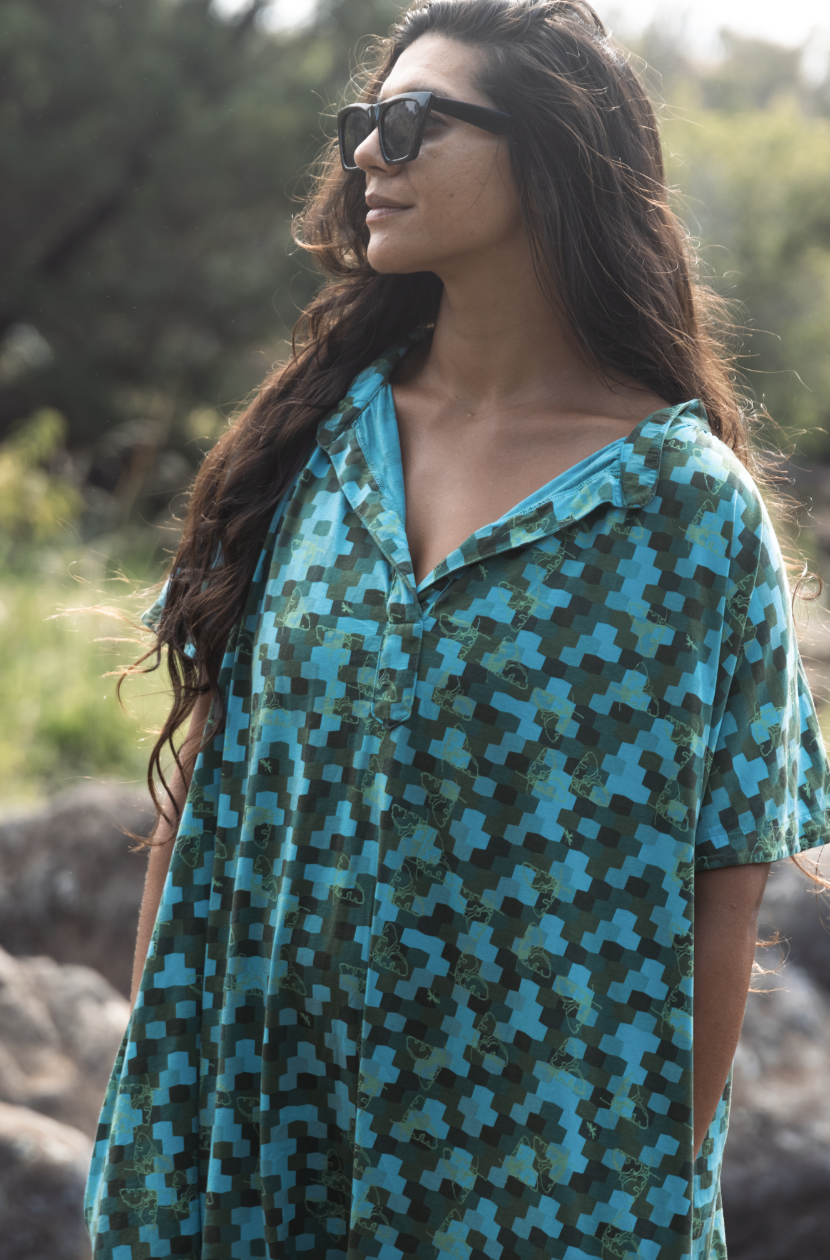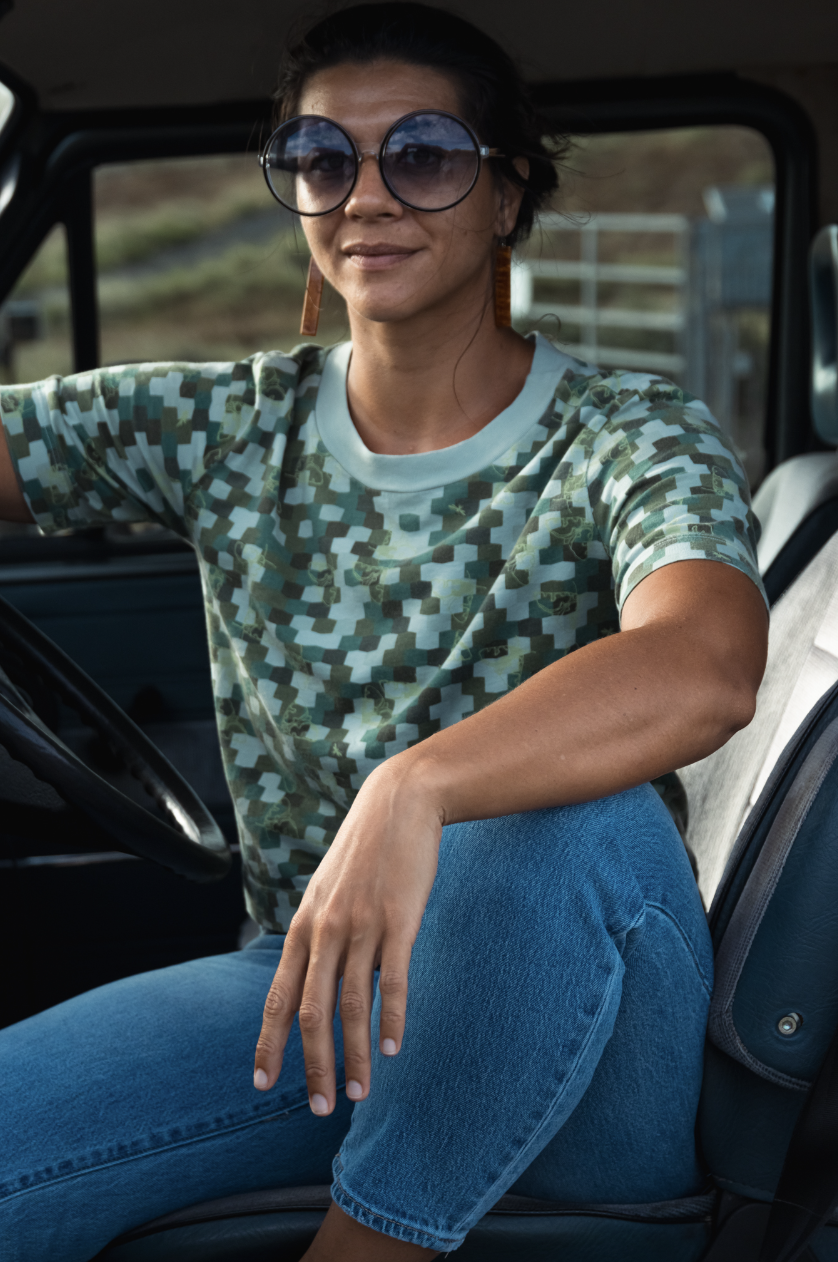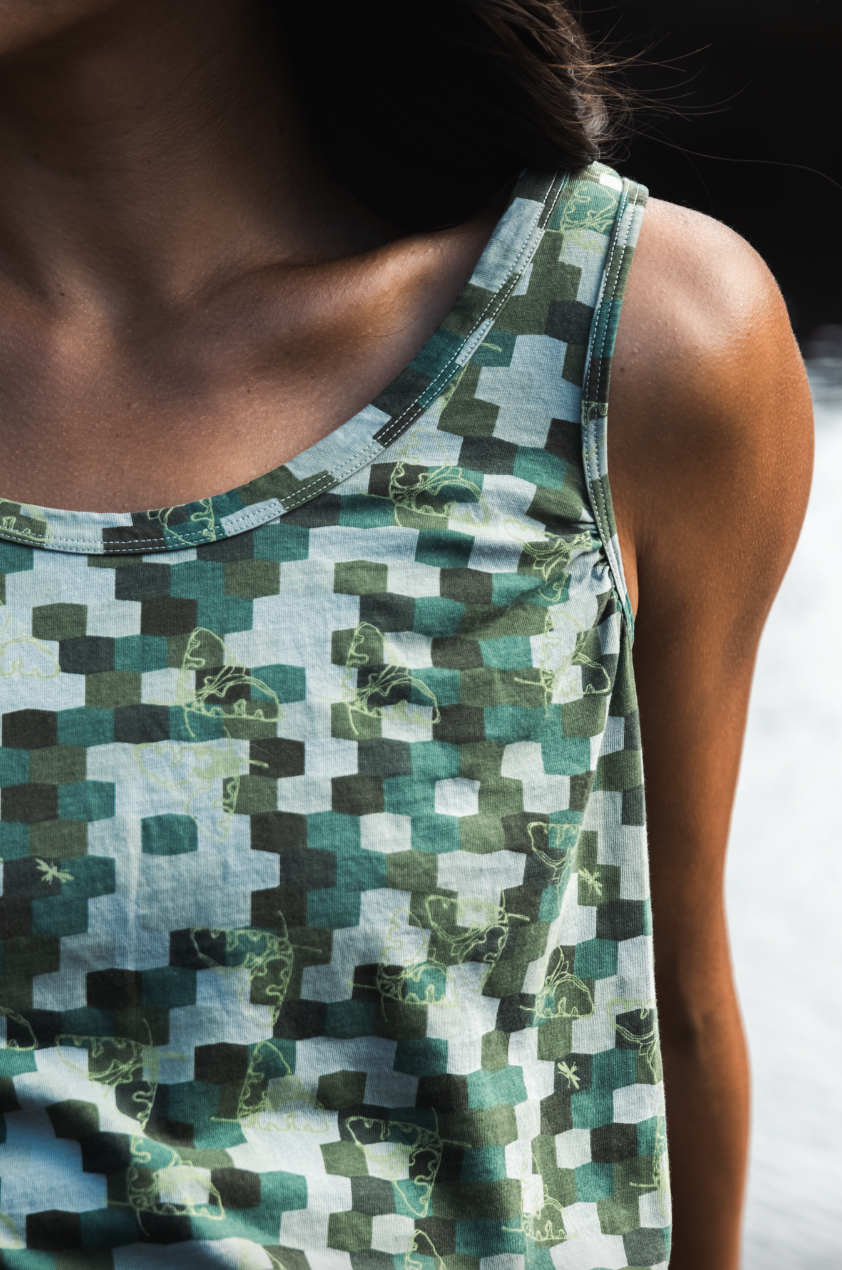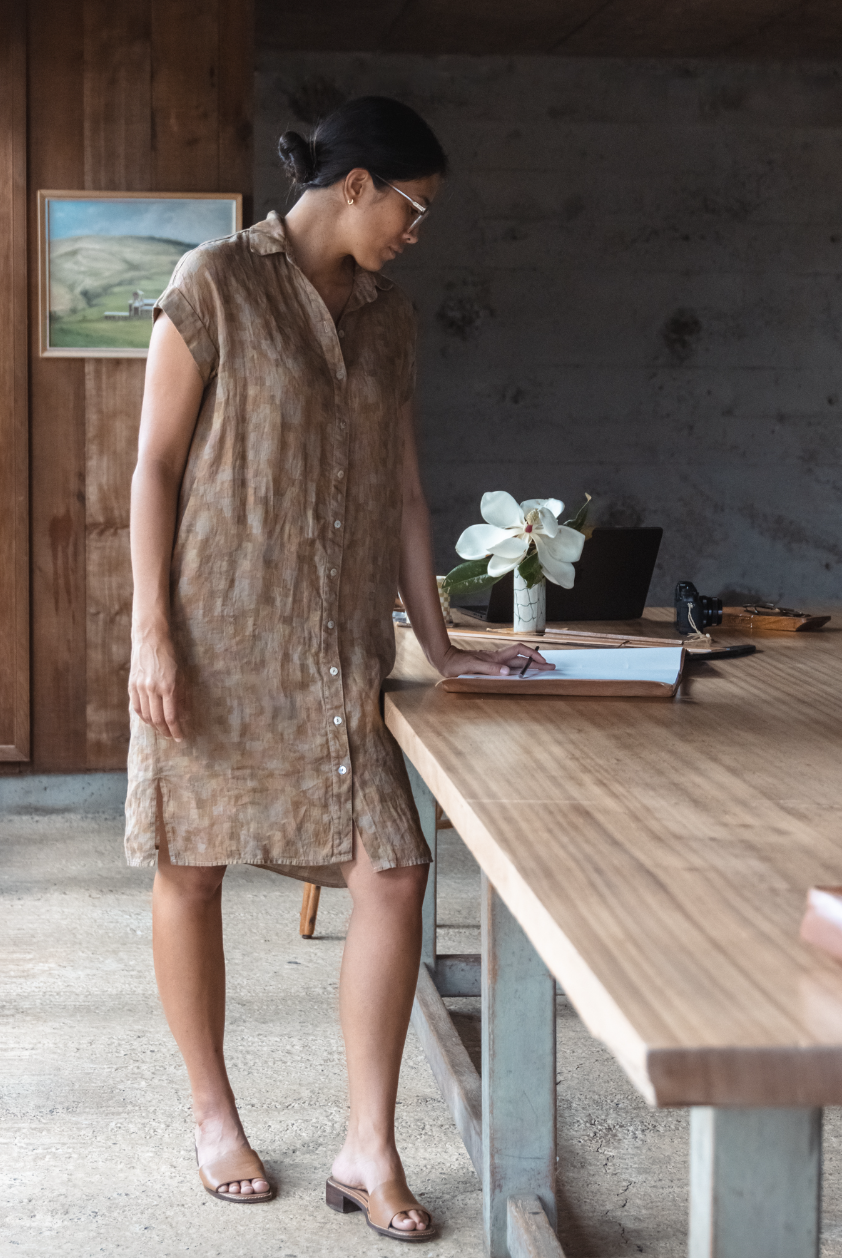Moʻoinanea
Luʻukia attempts to kill Haʻinakolo when her guardian is led astray
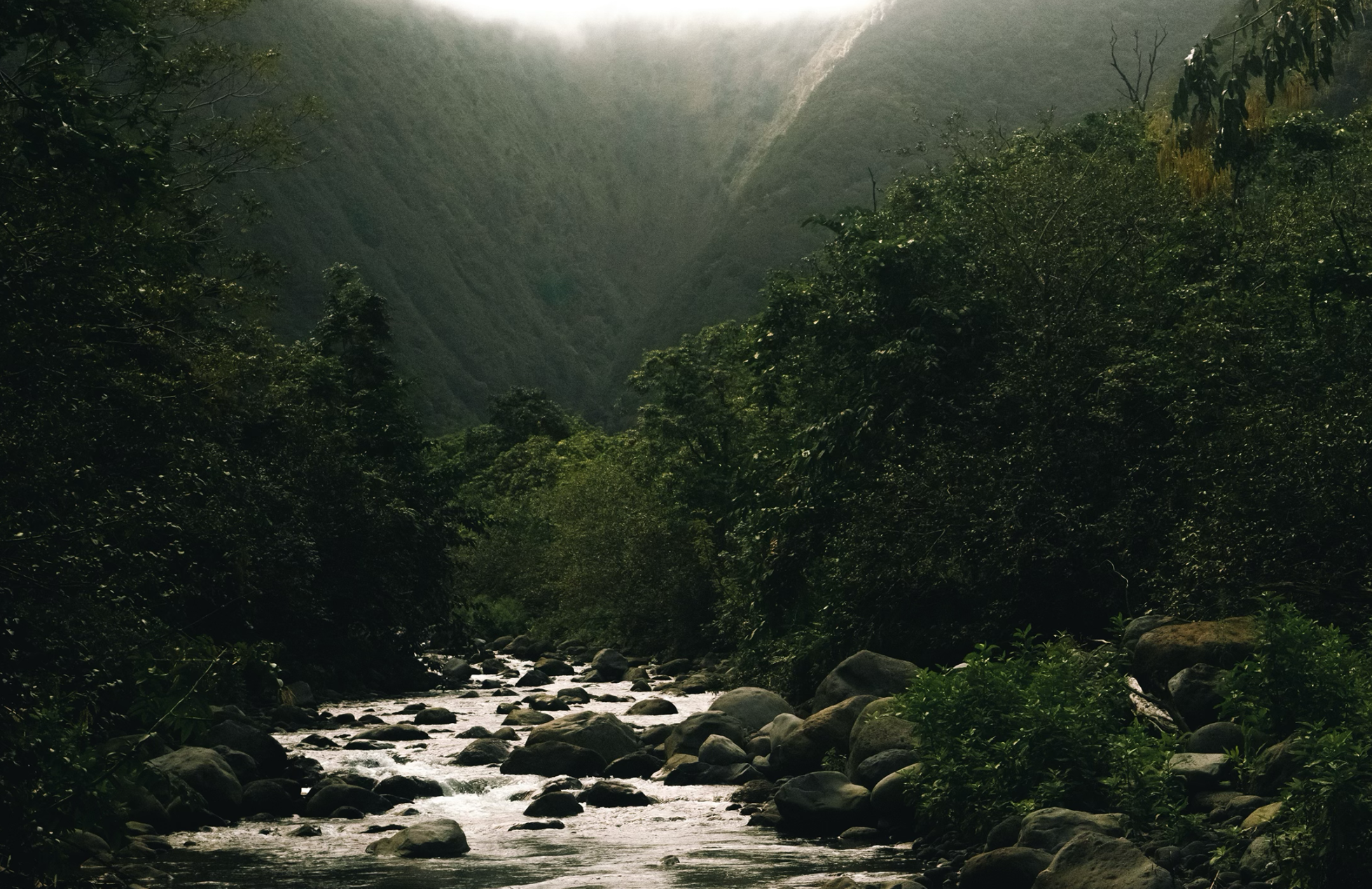
On Moʻo
When it comes to change and transformation moʻo are the ultimate beings. Like the waters they guard, they can shift shape, take on new forms, and fill spaces quietly. They can separate off parts of their bodies—even gift them out as objects of power—and their kino are embedded in our landscapes from Haʻehaʻe to Lehua.
Writer Moses Manu positions Moʻoinanea as an ancient progenitor being who separates itself into five lines: Aliʻi, akua, kāula, kahuna, and makaʻāinana. This suggests that our moʻokūʻauhau, the lines of descent that fill our long bones with mana and give strength to our iwikuamoʻo (spine), connect back to this powerful being. Moʻoinanea can present as wahine or kāne, as moʻo or manu, and always manifests as a protector of resources. It is Moʻoinanea who guards the path to the summit of Maunakea, the place of Waiau, our most sacred body of water. In the version of Haʻinakolo that we celebrate this year, Moʻoinanea guards the wahine of Waipiʻo’s royal family.
Moʻo often emerge in stories to help or hinder a person on their journey. Moʻo ask us to examine ourselves and our motives. They challenge us to face adversity, rise up to change, and to shift perspective in order to grow. Things are not always what they seem. Moʻo remind us to seek higher counsel when situations get challenging and to trust in the wisdom of the elders, in moʻokūʻauhau and moʻolelo - teachings passed down in succession to each generation.
E hoʻi hou i ka iwikuamoʻo
Context for this part of the moʻolelo of Haʻinakolo
While Hina was carrying Haʻinakolo in her belly, a kupua named Keaukānaʻi came to Waipiʻo from Kuaihelani in search of a wife for chief Kaʻulawena. Hiʻilei, one of Hina’s younger sisters, was chosen to go. Before Hiʻilei’s departure, she and Hina agreed that if Hina had a girl and Hiʻilei eventually had a boy, the two children would be paired at maturity. Loheloa, their brother, accompanied Hiʻilei and Keaukānaʻi to Kuaihelani to assure safe passage and bring word of that land back to Waipiʻo.
When Haʻinakolo reached fifteen, Hina & Kū asked Loheloa to make a second journey to Kuaihelani to see if Hiʻilei had indeed had a son for Haʻinakolo to marry. On the day of his departure, Haʻinakolo’s parents and all the aliʻi of Waipiʻo went down to the ocean to see Loheloa off on his journey.

Ka Nai Aupuni
8-12 Apelila 1907
At the time when Hinaʻaiulunui, her husband, their royal parents, their close circle, and all the other chiefs of their court were preparing to go down to the shore of Kanukuwai to farewell Loheloa on his journey to Kuaihelani, Moʻoinanea was set up to guard the young chiefesses, Haʻinakolo and her younger sisters (Mailepākaha and the others), as per Loheloa’s orders.
When the royal traveling party left the uplands of Kapahi and made their way down to the shore, Luʻukia summoned her guardians, Kaholoholouka and Kaholoholokai to come see her. When these two old men came before Luʻukia, their hānai daughter, she told them, “My fathers, I called the two of you here because I have an important idea that I wish to share with you. I shall tell you now, so listen to me. I have a deep desire to put an end to one of Hina [and Kū’s] daughters, so you two shall figure out how to make this happen. As you both know, I’m completely fed up with folks constantly remarking about the beauty and grace of this wicked thing, thus I have absolutely no desire for my cousin Hiʻilei’s son to become the husband of this ragged little mat of Waipiʻo. So, starting now, martial your skills to defeat my enemy. My message today is this, so you, my guardians, both understand: If you love me, then you two must bring forth all your knowledge to fulfill my wish; and that is how you will prove your true aloha for me. So what do you think? Will you two put an end to the one who irritates me so much?”
When Kaholoholouka and Kaholoholokai heard the intentions of their hānai in full, and her wishes to murder Haʻinakolo, they were deeply saddened by the severe nature of what she said she wanted. The men hung their heads down for a moment, then raised them again. Kaholoholouka looked at their hānai and he saw in her face and her whole disposition that she was full of anger and rage, so they knew that it was useless to try and calm her by sharing their thoughts.
At that point, Kaholoholouka replied to her, “Listen, our child, your biological mother only birthed you, and we have cared for you from the time you left the womb until now. You have become very important to us. Although this is a very serious request that you’ve made to us, an idea that we find shocking, how can we simply focus on the burdensome nature of it? You, our daughter, are what we must concentrate on.
“The desire you spoke of, for us to kill Haʻinakolo, we’ll tell you what we know now, which is this: We'll perform our prayers today, and if they get past Moʻoinanea, the one guardian who dwells with Haʻinakolo and her younger sisters, then our wish will be fulfilled. However, if Moʻoinanea catches wind of what we are plotting, then we’ll be the ones in a regrettable position.
"This is the first thing we’ll do is go and fish for ʻōpae (shrimp) and ʻoʻopu (goby fish), enough for each in Haʻinakolo’s circle who reside in the uplands of Kapahi. That’s how much we'll get. We’ll direct our prayers into these ʻoʻopu that we prepare and when all is ready, then you alone, chiefess, will take it and give it to your nieces. It must be no one else. For you are their aunt, and no one will remark when you go up to Kapahi to see your nieces.
ʻOʻopu nōpili. Pic: Keahi Bustamente
ʻOʻopu nōpili. Pic: Keahi Bustamente
"And before you go up with these ʻoʻopu, we will release our butterfly body forms in the uplands of Kapahi and they will pass before Moʻoinanea’s eyes. When they see these butterflies, they’ll assume their many body forms and leap about to catch the butterflies, for that is a moʻo’s favorite thing to do. And when Moʻoinanea is engrossed in capturing butterflies, that’s when you should arrive outside of Haʻinakolo folks’ home. Enter the house and when your daughters see you, they will welcome you warmly.
“You must eat two bundles of ʻōpae and two ʻoʻopu, and the other bundles that we focus our prayers on are the remainders you will give to your nieces. If all of them eat these ʻōpae and ʻoʻopu, the girls who you call by maile names will become maile vines. And the one who irritates you, she will become insane. However, if she does not eat her ʻōpae and ʻoʻopu, and just smells the fragrance of the ti-leaf wrapper and the food, then your revenge, my dear, will have to wait until another time.”
Luʻukia responded to her guardians, “So, I shall be the one to carry these ʻōpae and cooked ʻoʻopu? Isn’t that a really laborious task for me to ferry these bundles all the way up to Kapahi?” Luʻukia asked, then she continued speaking, “Something's troubling me about what you two said. You didn’t confirm that Haʻinakolo will die by your efforts. Why should she escape alive when she is the very mote in my eye? She needs to die. I don’t wish for her younger sisters to die, they are of no concern to me.”
Kaholoholouka replied, “Your niece will die if she eats the ʻōpae and the ʻoʻopu, but you must remember, my dear, she has no shortage of guardians. And that’s who will save her if they find out about our plot. The guardian we’re talking about is Moanalihaikawaokele, the close friend of your folks’ brother in law, Kūʻaikauaakama. And if not him, then it’ll be Kūwahailo, your folks’ sacred chiefly elder, the paramount supernatural of Kuaihelani. These two men have powers that our family gods cannot contend with.
"In response to what you said about carrying these bundles of ʻōpae and ʻoʻopu that we make up to Kapahi, one of us will take care of this important task, but when we get close to the house of these girls, that’s when you should grab the bundles and take them into the house.”
“And if we do it that way, it should work?” Luʻukia said, but she did not leave them time to answer. “Do what you need to do to exact my revenge.”
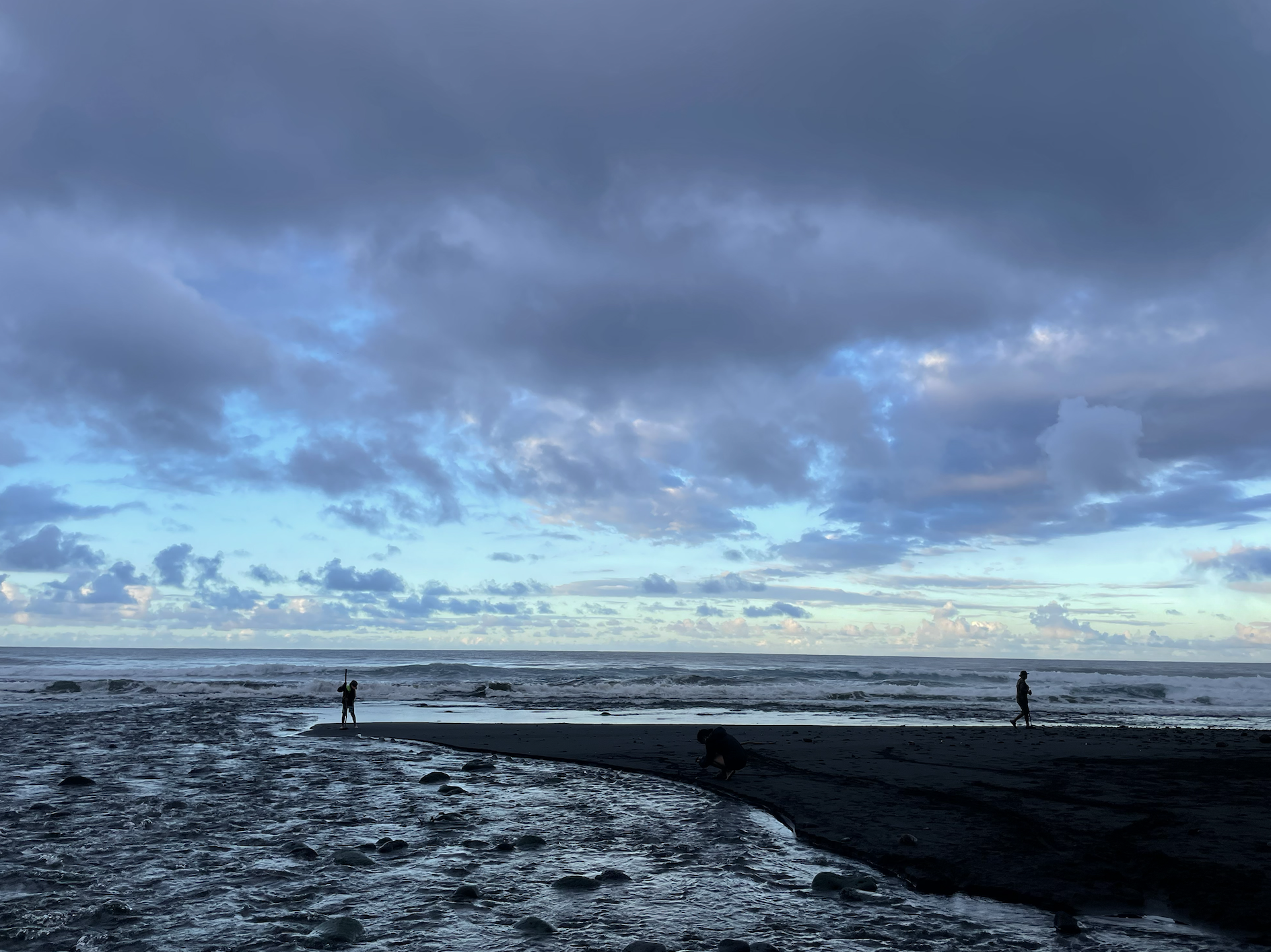
At that point, the two old men took their fishing baskets down to the river. They did not fish for long and their baskets were full of ʻōpae and ʻoʻopu. They returned home and prepared the bundles. There were six of Haʻinakolo folks, so there were six ʻōpae bundles and six ʻoʻopu bundles. Haʻinakolo had one ʻōpae bundle and one ʻoʻopu bundle. It was the same for Mailelauliʻi, her younger sister, Mailepākaha, the next youngest sister, Mailekaluhea, who came after them, and then Mailehaʻiwale and Mailelaunui, the youngest sisters.
This is how the ʻōpae and ʻoʻopu were apportioned for each girl: in Haʻinakolo’s two bundles, there were 15 ʻōpae and 15 ʻoʻopu; in Mailelauliʻi’s, there were 14 ʻōpae and 14 ʻoʻopu; in Mailepākaha’s bundles, there were 13 ʻōpae and 13 ʻoʻopu; in Mailekaluhea’s bundles there were 12 ʻōpae and 12 ʻoʻopu; in Mailehaʻiwale’s there were 11 ʻōpae and 11 ʻoʻopu; and in Mailelaunui’s bundles there were 10 ʻōpae and 10 ʻoʻopu.
We can see that these men matched the number of ʻōpae and ʻoʻopu in the bundles for Haʻinakolo and her younger sisters to each of their ages, Haʻinakolo being 15 at this point. Mailelauliʻi was 14, Mailepākaha was 13, Mailekaluhea was 12, Mailehaʻiwale was 11, and Mailelaunui was 10.
When these bundles were all wrapped up, the men directed prayers of peril into each one. But their prayers over all the ʻōpae and ʻoʻopu bundles for Haʻinakolo’s younger sisters were to deliver their particular form of defeat: to become actual maile vines growing wild in the upland forest.
And when they prayed over Haʻinakolo’s bundles, they prayed for the life in her body to leave completely, or that she be made insane and a vagabond woman. Yet as these men prayed, inside them was a loving thought of pity for Haʻinakolo, which sort of secretly influenced the prayers for her death such that if she didn’t actually die, she’d become a crazy woman.
When the old men’s ʻanāʻanā prayers, as we’d call them today, were done and the bundles of ʻoʻopu and ʻōpae they had prepared were finished, they also made bundles for their hānai, Luʻukia. When these bundles were all tied up, they said a prayer for health and cleansing over them.
And when all the bundles were cooked, they placed these things on an immaculate wooden tray and entered the house of their hānai. Kaholoholouka said to her, “The defeat of your enemy and her younger sisters has been prepared. Look here, their lives are tied up in these bundles of ʻōpae and ʻoʻopu. You will deal a true blow to your nieces by feeding these to them. So, you must go up, my dear, with Kaholoholokai to Kapahi, to where they live.
“He will carry the food bundles. And when you two get up there, you must give the bundles to each of your nieces with your own hands. You should do it like this: unwrap the ti-leaf of each bundle before each of them, every single one of your nieces. You must do this while also pitifully lamenting everything that has happened, from the highly significant to the trivial. And you must shed tears, too, so that your nieces see you crying and firmly believe that you really love them.
As soon as the flesh of the ʻōpae and ʻoʻopu touch their mouths, the prayers will take effect on them. Today, when they eat what we’ve prepared using our priestly skill and expertise in these arts, death will ravage them. And if we do not hear it today, then tomorrow we will hear resounding wails of grief like never before in the uplands of Kapahi. However, you must do this quickly, lest Aniani find out and become alarmed, as well as Moʻoinanea—who will be lost in catching butterflies—and our efforts will be unsuccessful.”
When Kaholoholouka finished speaking, Luʻukia replied, “I have no desire for all of my nieces to die. I have just one evil that I want gone, and that’s their oldest sibling. So, let me explain again what I want, which is for you to do something less intense than what you just did. I must also tell you both that I did not say that I wanted the younger nieces of mine to be included in the plan that I presented to the two of you. Just my nemesis. I heard what the two of you just said about the bundles of ʻōpae and ʻoʻopu that you prepared, but I did not make my thoughts clear to you at the time you were doing it. I made a mistake there. So, what you do to fulfill my wish should be something mild.”
Because of what Luʻukia said, her guardians became exasperated and Kaholoholouka said, “If that is what you wish, my dear, then we should postpone what we’re doing until another time.”
Luʻukia quickly replied, “What I want is not at all what you just said. This is the best day to fulfill my wish. Everyone is at the shore and only that little miscreant and her younger sisters are home.”
Then Kaholoholokai said, “If that’s true, then I’ll go up myself to Kapahi and do what I must do, and if all goes well, your wishes will be fulfilled.”
Luʻukia agreed to her guardian’s idea. So, the two old men did not hesitate and left the house, returning to their humble abode to discuss what Kaholoholokai would do.
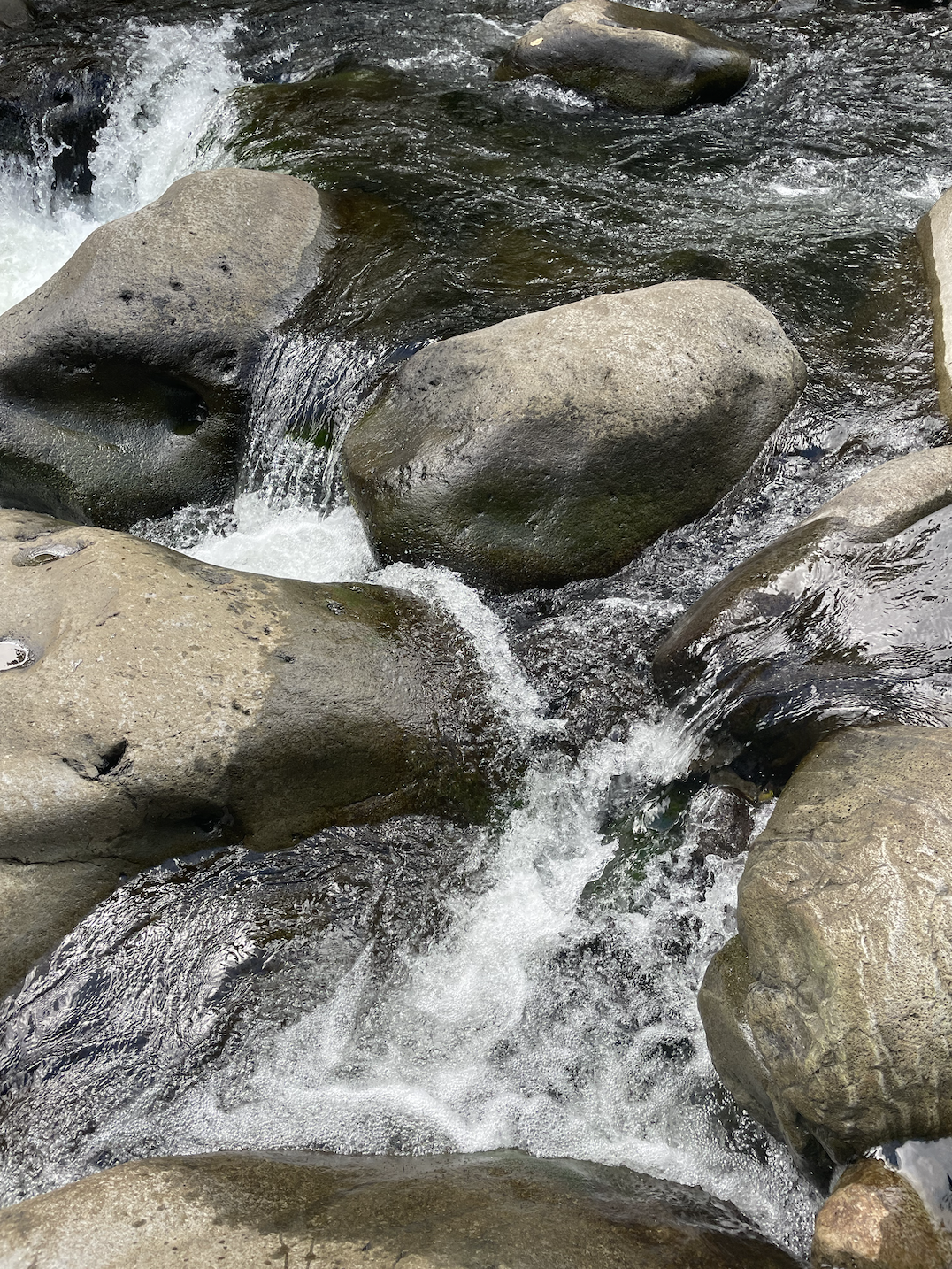

What they decided is that Kaholoholokai would take the two bundles they’d prepared for Haʻinakolo up to Kapahi. He’d be the one to give them to Haʻinakolo and say to her that these are a few morsels of food from the river of Hiʻilawe that have been sent to her by their dearest aunty, Luʻukia.
Together they decided they’d first send the butterfly body forms of some of their powerful family gods to the fields above that place, so that Moʻoinanea would be entranced in catching them and would move away from Haʻinakolo folks’ house. So, Kaholoholokai recited a prayer to call the lepelepeohina (Kamehameha butterfly), the ʻōkaʻi (night moth), and the pūlelehua maoli (other butterfly species) to go up to Kapahi and flutter past the eyes of Moʻoinanea.
In no time, the skies of Kapahi were swarming with hundreds of thousands of lepelepeohina, ʻōkaʻi, and pūlelehua. Moʻoinanea immediately went to catch these wondrous things that flew up in front of their eyes as they sat at the door of the young chiefess’ house.
When Moʻoinanea saw these flying insects, that the throat of their moʻo form craved, they immediately left their human form and returned to their moʻo form, but rather than one body, they became numerous tiny moʻo running about to catch the butterflies. These butterflies fled up to the uplands, and the moʻo followed together chasing after them.
These strange butterfly body forms of Kaholoholouka and Kaholoholokai ran away from Moʻoinanea in their multitudinous moʻo bodies and filled the uplands. Kaholoholouka and Kaholoholokai knew that Moʻoinanea had “gone wandering off.”
That’s when Kaholoholokai went up with his ʻōpae and ʻoʻopu bundles that had been tied up with prayers that intended for the demise and devastation of Haʻinakolo’s life. Kaholoholokai quickly went up and perched outside of Haʻinakolo folks’ house. Then, one of the girls, Mailepākaha, inquired about whether this was the old man that their parents had arranged to guardian them, saying, “Where did you disappear off to?”
Kaholoholokai knew they had mistaken him for one of the elderly men that guarded the families of these young royal women, and he replied, “I went to go and get ʻōpae and ʻoʻopu for you folks. But, I did not get a lot. Just a handful of ʻoʻopu and nōkea type ʻoʻopu. I made two bundles myself. Would you ladies like to have some food?”
Mailepākaha replied, “Shoot! We cannot eat ʻoʻopu or ʻōpae at the moment. We are prohibited from eating those things. It’s best that these bundles go to our older sister, because she’s the one out of us who’s not forbidden to eat ʻōpae and ʻoʻopu.”
“If that’s the case, then your suggestion is fitting,” Kaholoholokai replied. Haʻinakolo heard these murmurings between Mailepākaha and the old man, at which point she asked the younger sister, “What are you discussing there, Mailepākaha?” The younger sister replied, “What indeed; I shall tell you. Our elder just went to get ʻōpae and ʻoʻopu. He brought two bundles for us. One bundle of ʻōpae and one bundle of ʻoʻopu. But I just said that you’re the only one of us who can eat ʻōpae and ʻoʻopu, and that we’re restricted from those foods.”
Haʻinakolo and all her younger sisters came and gathered by the door to check out the bundles. Then, Haʻinakolo spoke to Kaholoholokai, the old man they all believed to be their guardian, who had actually gone to catch butterflies “on the cliffs of Kalalau.”
She said to him, “These bundles that you brought for us smell quite delicious. None of them can eat ʻōpae and ʻoʻopu, so I am the only one who will partake of that which you patiently worked for in the cold. So, you stay there, and I’ll sit here and eat heartily this delicacy of cooked fish that you’ve brought.” Then, Haʻinakolo turned around with the intent to speak to her younger sisters, but she was immediately overcome by something strange, her face grew bright red, and she began to cry. She turned back toward Kaholoholokai, her eyes now bloodshot, and began chanting this song, which could also be called a prayer.
Below is the chant and prayer that Haʻinakolo gave, and it is for you, friend, to decipher the larger meaning and the deeper insight of this mele.
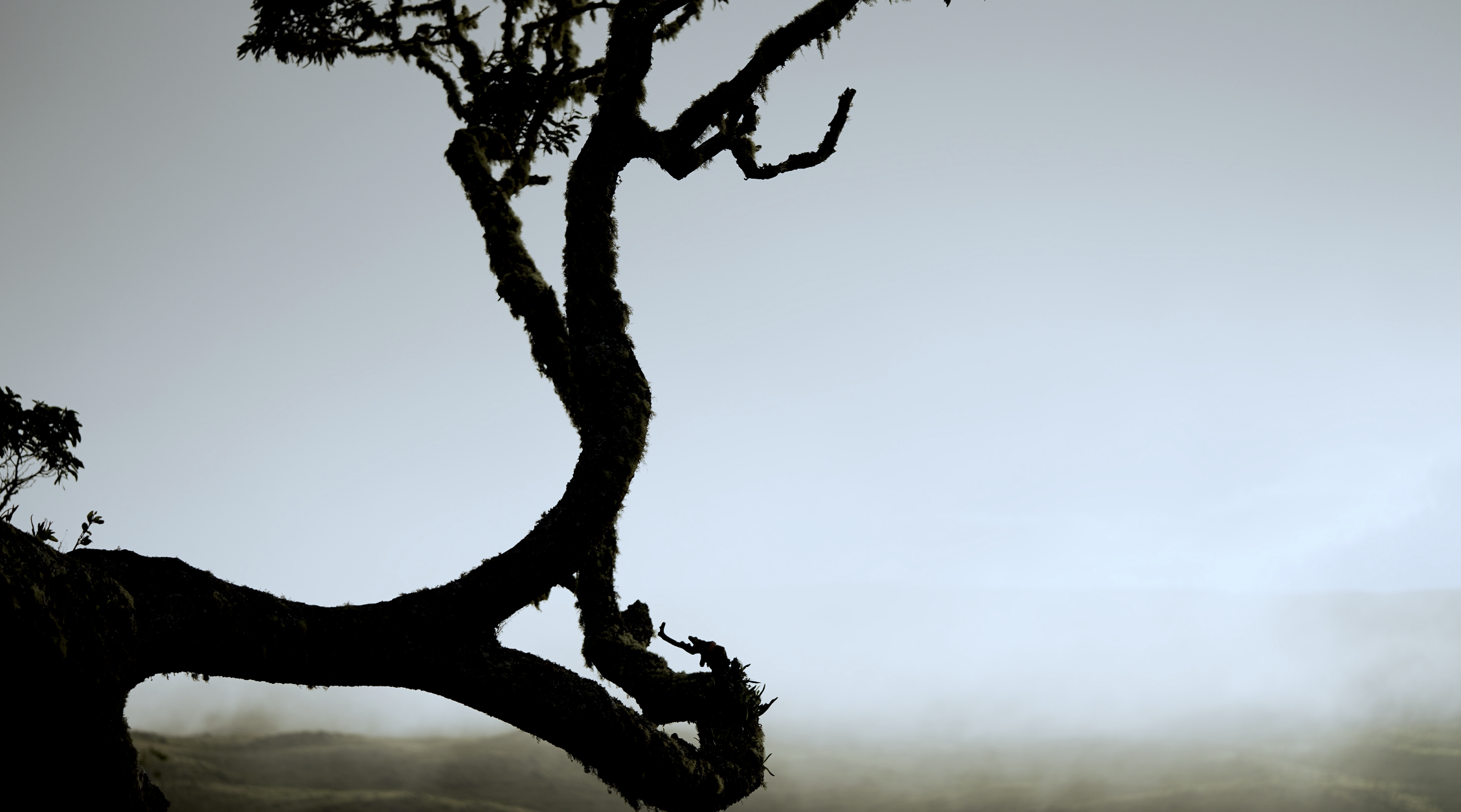
NUMBER 20:
A Chant of Woe for Luʻukia
Beloved are the leaping falls of Hiʻilawe,
The vicious lawakua wind strikes,
Tearing apart the clouds without regard,
It does not hearken or welcome,
A thought arises, a darkness within,
You are hard-hearted, mother,
I am the recipient of your cruelty,
Yet I love you, Luʻukia, woman of the cliff,
Your eyes, distant from me, your niece,
Alas!
And you two, Kulauka and Kulakai,
The sea that comes up the base of the cliffs,
Bringing ʻoehaʻa and paheʻe (deceit and lies),
I slip on the līpalawai seaweed of my land,
Tangled in the feelers of the shrimp,
Biting, in error, the tail of the ʻoʻopu,
Where desire, lust, and intention have been gathered,
Yet I am the garnish on the day of hunger,
Turn!
Look at me, Luʻukia,
Release the offense, get rid of the jealousy,
For I am a part of your family,
That which fills the long bones,
I twisted together the strands of your love, dear aunty
I secured them and tied them up,
I will not consume the food of the gods,
I will not consume the hand-caught fish,
It is your love, Luʻukia,
That will satiate me, like a parent,
Regards to you Kaholoholokai,
Beloved father dwelling seaside like an ʻūlili bird,
Alas!
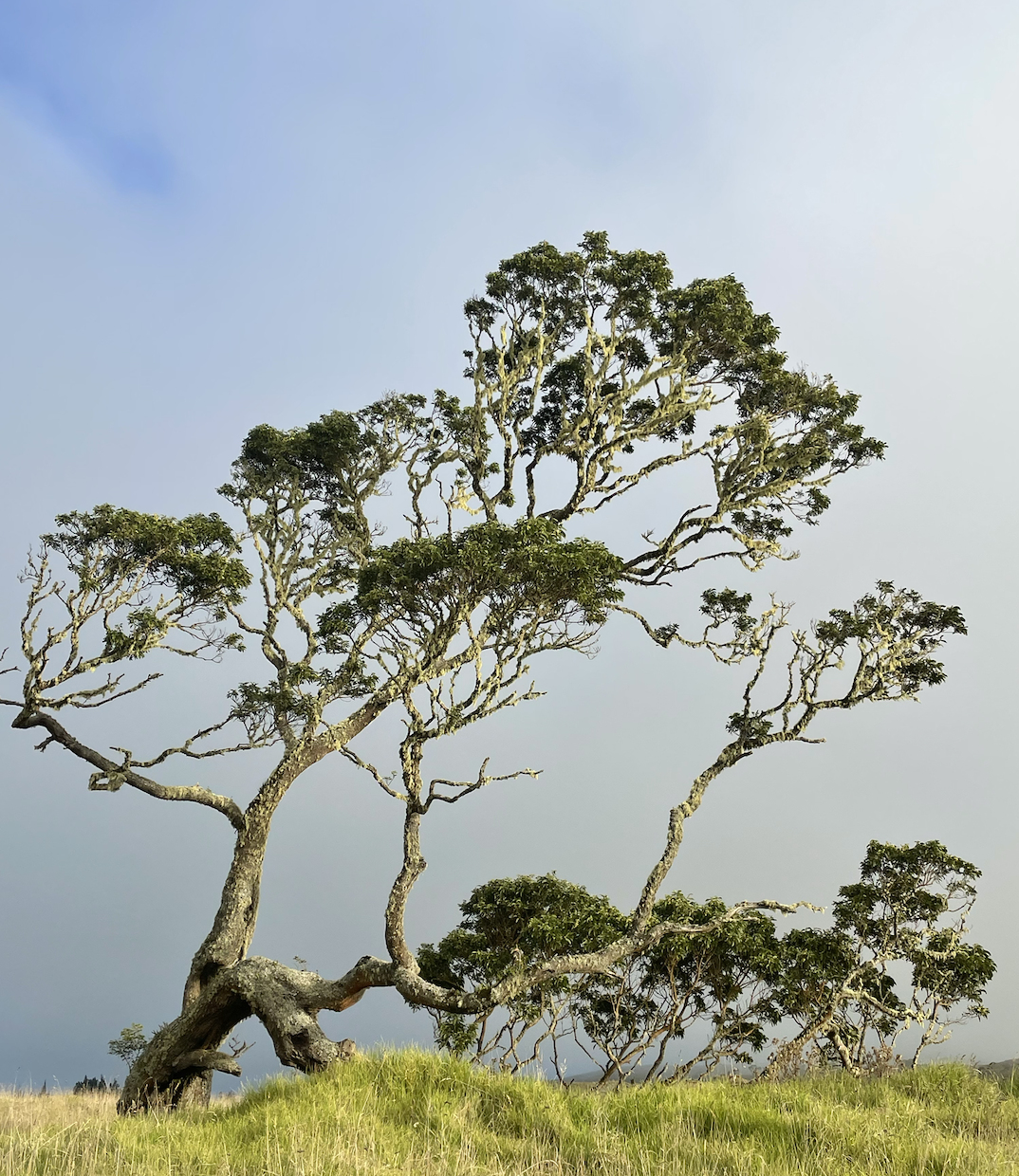
When Kaholoholokai heard this chant of Haʻinakolo, he could not hold back the tears in his eyes, and he wept. Then Haʻinakolo asked him, “Why are you crying, Kaholoholokai, the uncle and guardian of my aunty, Luʻukia, in the sacred cliffs of Waipiʻo?”
Kaholoholokai replied, “I’m crying with relief at your escape, for you nearly died by the ʻōpae and ʻoʻopu I brought from the lowlands. I thought you wouldn’t know what my older brother and I were up to. As it turns out, the evil deed we mercilessly took up against you without regard has been revealed. So, I apologize to you for my wrongs, and I ask you to forgive me. I was wrong.”
“Yes, I forgive you folks for this evil you’ve done against me. I, of the same flesh as you all, my elders and parents; my aunty, in fact, wanting me to die. One would think my demise would come from outside, but here it is from within my own family. Luʻukia abhors me. What have I done wrong for her to hate me? We have barely any time here, then we die and our spirits go on the long path, the path of the spider. And if I didn’t have a grandfather who resides in Kuaihelani, this would have been my day, I would have died by you, Kaholoholokai. Make no mistake, because I have a grandfather that loves me, the death that you planned for me has passed, death by eating cooked ʻōpae and ʻoʻopu. So, you shall go back down to my aunty and tell her how much I love her.”
As Haʻinakolo spoke to Kaholoholokai, her younger sisters were in a panic, tears rolling down their cheeks, and they each pressed noses with their older sister, asking, “What is this trouble we are in, big sister?”
Haʻinakolo replied to her younger sisters, “What indeed?! This would have been a huge blow to us, my younger ones, because of the animosity and evil of our aunty, Luʻukia. Our death was set in those bundles of cooked fish that we all just witnessed and see before us now.
“In no time at all, I would have put the ʻōpae as well as the ʻoʻopu in my mouth, but I was saved by our grandfather, Kūwahailo, who lives in Kuaihelani. It is only because he took possession of me that I, your older sibling, was clearly shown my impending death. And had I died, you would all fall after me, my younger sisters. That’s it, so you folks know, my dear younger sisters. We escaped near death and craziness in our home.”
As Haʻinakolo spoke, her younger sisters just cried with sorrow at having barely evaded death. Haʻinakolo spoke to her younger sisters again, “Here is my thought to you all, you must quell your rage, for we have kind and forgiving hearts. This uncle of ours apologized to me, so you folks should release the wrongdoing. Forgive him and do so completely.”
After Haʻinakolo spoke with her younger siblings, Mailepākaha replied, “Well, you’ve said, older sister, that we should forgive the wrongs of this guardians of our wicked aunty. So, his actions are of no consequence; we forgive their poisonous transgression against you. I forgive all of them from the crown of my head to the soles of my feet. Inside and out, front to back. Nothing remains.”
The maile sisters all cheered, except the youngest of them, Mailelaunui, who was 10 years old. She said to her older sisters, “Listen, my older sisters, from you, our eldest and leader, down to all of them. You have all forgiven the wrongs, transgressions, jealousy, wrath, and hatred of our aunty and our grandfathers. Except for me. The kalo dies, but lives on through the worm. We forgive them and the bad kalo has been pulled out, but how will our lives be after this? Will the worm not emerge again to rot us out like the crops of Makaʻukiu? And if not us, then will it be our offspring? So, here’s what I think. Our aunty must agree to meet with you, our older sister. If she agrees to a meeting, then I’ll extend forgiveness to her; but if she refuses, my view shall remain with me.”
Haʻinakolo replied, “Hula is enjoyable because of the chanter. We older sisters have risen to dance the enjoyable ancient hula called the mākalakalahia, and you, my younger sister, are our chanter. So what shall it be? We, your older sisters, stand at the pinnacle of forgiveness for the evils of our aunty and elders. And you too should stand with us, so that you may lead and chant for our hula.”
Then, Haʻinakolo turned and said to Kaholoholokai, “You're hearing our silly ramblings, uncle. All of us oldest sisters forgive you, our aunty, and our other uncle. And you’ve heard the statement of your youngest granddaughter; she will only extend her forgiveness to Luʻukia if she agrees for the two of us to meet.
“Uncle, you may want to consider whether or not this perspective of your grandchild is right. If you agree with Mailelaunui’s thoughts, then you should go and tell our aunty that it’s imperative that we meet. Since from the time I learned to speak all they way up to today, we’ve never looked each other in the eyes.”
To be continued…
